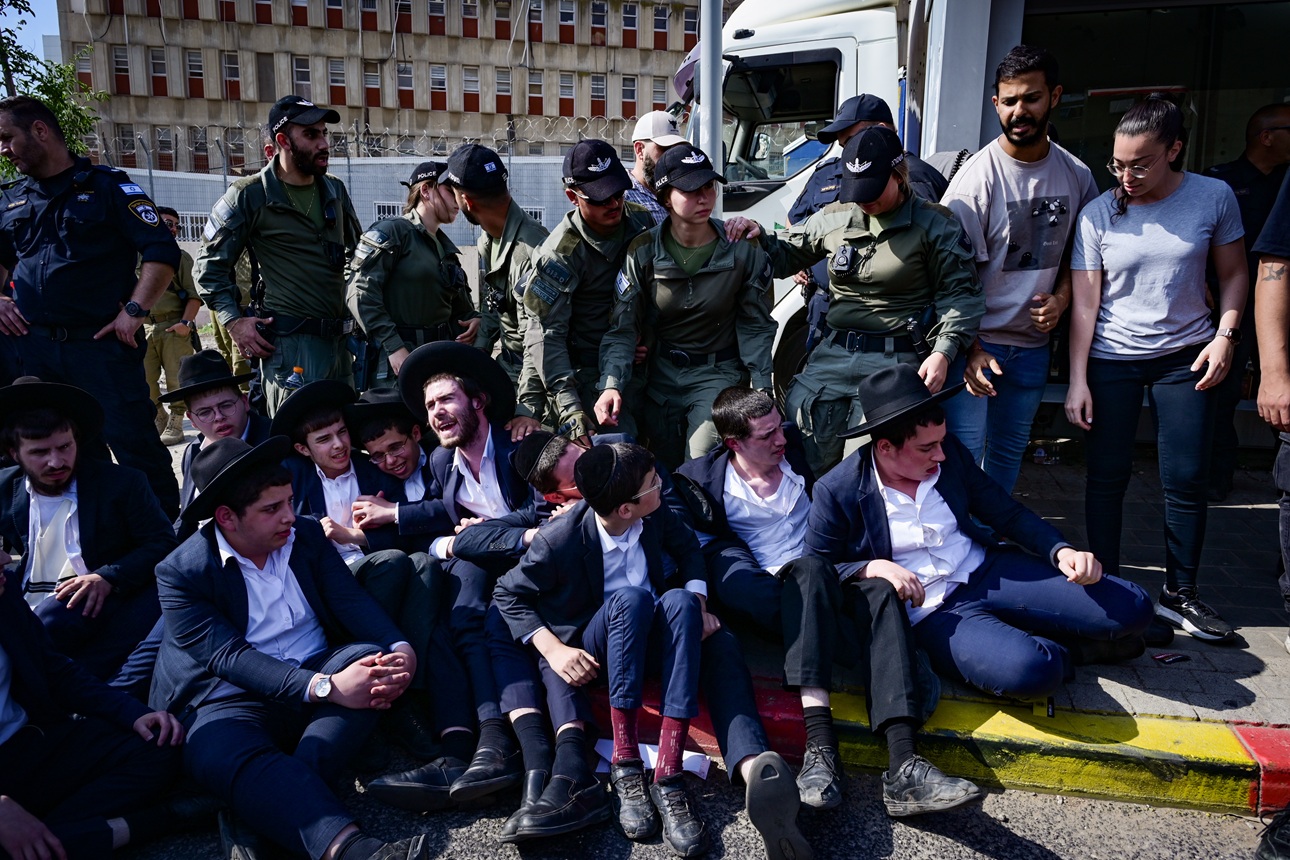Enlisting Marginalized Young Haredim

Photo by Avshalom Sassoni/Flash90
Above the chorus of voices in Haredi society bemoaning plans to enlist the community’s young men into military service, and among the regular cries of “We shall die rather than enlist,” sharp-eared listeners can also hear another whisper: “We will enlist, but not all of us.” This camp of whisperers is headed by one of the two rabbinic leaders of Lithuanian Haredi society—Rabbi Moshe Hillel Hirsch.
As a pragmatic leader, Rabbi Hirsch has realized that change is underway, and things will not remain as they were. Israeli society is under no circumstances willing to continue granting a sweeping exemption from military service to every young Haredi man based solely on his affiliation to the Haredi community. For this reason, Rabbi Hirsch is proposing an outline for a plan in which the Haredi leadership will allow the enlistment of all those young people who do not, in practice, engage in studying Torah, and in return, exemptions from service will be given to those yeshiva students for whom Torah is indeed their "occupation" and who devote themselves fulltime to Torah study. This general outline—which, of course, has not yet been agreed—leaves a number of significant questions open.
The first question relates to the tens of thousands of young people who are somewhere in between the extremes described above: they attend the yeshiva study halls to at least some degree, but they also engage in other matters, including menial labor, whether reported or unreported to the authorities. Will they also be exempt, or will they be obligated to enlist?
Another question concerns the willingness of the “bride” who is being readied for the “wedding,” and the role of the “bridesmaids” and the “groom.” A significant portion of the young Haredim who do not study in yeshivot, or who populate the “light yeshivot”—semi-yeshiva frameworks designed for struggling Haredi youth, which provide only partial Torah studies—belong to the Sephardi-Mizrahi community. That is, the bulk of the proposed enlistees from the margins of the Torah world will seemingly come from this public. Until now, the Sephardi rabbis have been steadfastly opposed to such an unbalanced arrangement, and have called on all Sephardi young men not to enlist. It is quite possible that the bride-to-be, the Haredi Sephardi community, will flee from the arms of the Lithuanian bridesmaid attempting to lead her to a forced marriage.
At the same time, it is not at all clear to what extent the Israeli public who do serve in the military—who constitute the “groom” in this dubious deal—would be willing to accept such a meager and limited arrangement. This is especially true in light of the growing crisis in reserve duty and the illegitimacy of granting a sweeping exemption to a huge swathe of the Haredi public, who would constitute much-needed military manpower.
In practice, despite the deep fears of young Haredim becoming non-observant, being negatively labeled in their community for wearing an IDF uniform, and losing their Haredi identity and sense of belonging, there are proven rewards and benefits for those who do serve, as well as for the military, Israeli society, and the state. As has been demonstrated in previous research, including by one of the current authors, high-quality military service is a springboard for successful entry into Israeli society and the labor market, providing almost the only path to socioeconomic mobility for marginalized populations outside the dominant hegemony. For the young Haredim in question, who are a marginalized group in both Haredi and Israeli society, these benefits may be a decisive factor in the question of conscription.
In Israel, more than in other democratic countries, significant military service is a key asset and signifier for becoming a valued citizen, a marker of sacrifice indicating that the individual has contributed their share to the national effort, for the sake of the collective. Haredim who enlist from the fringe groups of this community will likely have to gradually replace the coveted Haredi status symbol of being a yeshiva student—one that in any case they did not attain, and therefore remained on the margins of Haredi society—with the status symbol of high-quality positions in the IDF, especially in combat units. Integration into combat units will mark them as worthy citizens who have contributed their share, and grant them a higher civil-social status outside their community, or on its margins.
However, most young Haredi men, even those for whom Torah is not their "occupation," have almost no knowledge of or familiarity with IDF service and the possibilities it offers.
This challenge has not gone unnoticed by various visionary Haredi entrepreneurs who understand the magnitude of the hour and have been working since October 7, and even before, to prepare young Haredim who do not study in yeshivot for combat service, and give them support throughout the process. These entrepreneurs do not receive any significant support from the state.
Instead of the government continuing to generously fund semi-yeshiva frameworks designed to protect Haredi youth on the margins from enlistment in the IDF, the Ministries of Education, Social Affairs, and Defense should regulate and fund the model being developed by the entrepreneurs and leaders of the 'Haredi' hesder yeshivot, which combine military service in special homogeneous units with periods of torah study in yeshivas. . The Ministry of Education has taken a good first step in this direction with their announcement that they intend to recruit 3,000 Haredim to such programs.
This arrangement will not fully solve the problem of sharing the burden of military service, but it will make it possible to meet the acute need for high-quality Haredi fighters in the people’s army—and it may also benefit the Torah world, which is currently unable to sort the wheat from the chaff with regard to the standard and quality of its studies.
